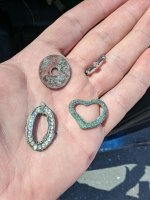billionaire
Sr. Member
- Sep 15, 2012
- 382
- 69
- Primary Interest:
- All Treasure Hunting
Hey theres been some talk about the US dollar going down in 10-20 years on the internet and some other places. I was just wondering if any of you guys believed this. If so the media stuff said people were gonna need to use silver and other metals for currency. I might need to hit up the banks soon and get a lot.
Upvote
0



